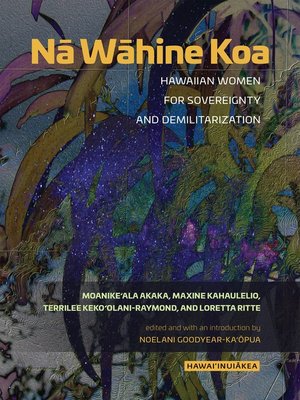Nā Wāhine Koa
ebook ∣ Hawaiian Women for Sovereignty and Demilitarization · Hawai'inuiākea
By Moanike'ala Akaka

Sign up to save your library
With an OverDrive account, you can save your favorite libraries for at-a-glance information about availability. Find out more about OverDrive accounts.
Find this title in Libby, the library reading app by OverDrive.



Search for a digital library with this title
Title found at these libraries:
| Loading... |
Na Wahine Koa: Hawaiian Women for Sovereignty and Demilitarization documents the political lives of four wahine koa (courageous women): Moanike'ala Akaka, Maxine Kahaulelio, Terrilee Keko'olani-Raymond, and Loretta Ritte, who are leaders in Hawaiian movements of aloha 'aina. They narrate the ways they came into activism and talk about what enabled them to sustain their involvement for more than four decades. All four of these warriors emerged as movement organizers in the 1970s, and each touched the Kaho'olawe struggle during this period. While their lives and political work took different paths in the ensuing decades—whether holding public office, organizing Hawaiian homesteaders, or building international demilitarization alliances—they all maintained strong commitments to Hawaiian and related broader causes for peace, justice, and environmental health into their golden years. They remain koa aloha 'aina—brave fighters driven by their love for their land and country.
The book opens with an introduction written by Noelani Goodyear-Ka'opua, who is herself a wahine koa, following the path of her predecessors. Her insights into the role of Hawaiian women in the sovereignty movement, paired with her tireless curiosity, footwork, and determination to listen to and internalize their stories, helped produce a book for anyone who wants to learn from the experiences of these fierce Hawaiian women. Combining life writing, photos, news articles, political testimonies, and other movement artifacts, Na Wahine Koa offers a vivid picture of women in the late twentieth- and early twenty-first-century Hawaiian struggles. Their stories illustrate diverse roles 'Oiwi women played in Hawaiian land struggles, sovereignty initiatives, and international peace and denuclearization movements. The centrality of women in these movements, along with their life stories, provide a portal toward liberated futures.






